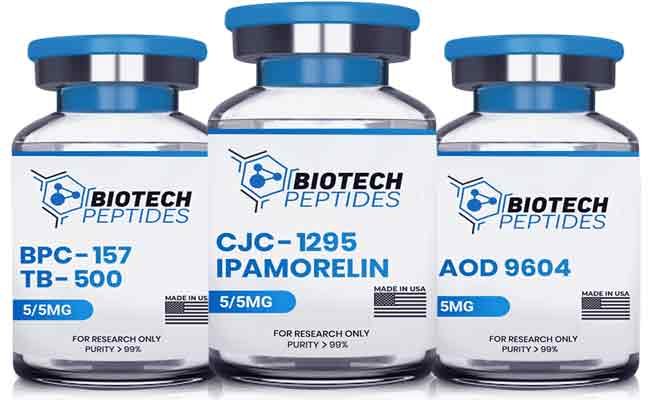
SOC – 2 Compliance Is the Most Effective Strategy to Gain Your Consumers
March 30, 2022
6 Benefits Of Video Marketing For Your Small Business
April 20, 2022Research peptides, short chains of amino acids composed of fifty or fewer units, have emerged as valuable molecules in the realm of molecular biology. Studies suggest that these peptides may support various physiological processes and have suggested broad utility within laboratory research. Naturally occurring in biological organisms, these peptides are believed to assist in processes linked to tissue repair, immune support, and metabolic regulation. For instance, investigations purport that peptides such as leucine-based compounds are commonly found in dietary sources, while others, like IGF-1 LR3, are synthesized under controlled laboratory conditions. These distinctions underscore the potential significance of research peptides in studying organismal function and molecular interactions.
Defining Peptides and Their Functions
Research indicates that peptides are characterized by the presence of peptide bonds, which form through a reaction between the amine group of one amino acid and the carboxyl group of another. The number of amino acids in these chains classifies peptides as dipeptides, tripeptides, tetrapeptides, and so forth, based on the number of amino acid residues.
Peptides are similar in structure to proteins; however, they are differentiated by their smaller size. Findings imply that peptides, with their relatively shorter amino acid chains, are structurally less complex than proteins and may be utilized by organisms in distinct biochemical processes. Peptides appear to serve as structural analogs of proteins and hormones, potentially influencing various biological pathways without provoking immune responses that might otherwise affect larger biomolecules.
The Scientific Foundation of Peptide Functionality
Research indicates that peptides differ from proteins primarily by size, with peptides defined as containing fifty or fewer amino acids. Studies also indicate that research peptides are often categorized by their method of synthesis, which can vary based on environmental factors and biological pathways. For example, casein peptides are synthesized during the fermentation of milk through the action of digestive enzymes or lactobacilli, while other peptides may arise through specific enzymatic processes. Findings suggest that such variations in synthesis provide insight into the functionality of these molecules.
Peptides are frequently categorized into ribosomal and non-ribosomal groups. Investigations purport that ribosomal peptides, such as microcins, are synthesized on ribosomes and may function as signaling molecules, such as hormones, in higher organisms. Conversely, non-ribosomal peptides are produced independently of ribosomes, typically through specialized enzymes, and studies suggest they serve various roles in immune support and antioxidant defense. For instance, findings imply that glutathione, a well-studied non-ribosomal peptide, may be crucial in the antioxidant systems of anaerobic organisms.
Additionally, investigations purport that peptides may exhibit different structural configurations. Researchers speculate that most non-ribosomal peptides are cyclic, although linear forms are also observed. Peptones, which result from the proteolytic breakdown of animal milk and meat proteins, are widely used in laboratories as components in nutrient media for microbial and fungal growth studies.
Applications of Peptides in Molecular Research
Scientists speculate that peptides may hold significant research value in molecular biology due to their versatility and biochemical properties. Scientists speculate that peptides are instrumental in creating peptide antibodies, which do not require organismal purification prior to experimental use. Findings imply that peptide sequences and masses might assist in the identification of proteins, which enhances the accuracy of mass spectrometry analyses in protein studies. This makes peptides valuable tools for identifying unknown proteins and mapping structural aspects of protein interactions.
Investigations purport that research peptides may also be valuable in cancer research, specifically in identifying peptides that may inhibit cancer cell proliferation. Prostate cancer, for instance, is an area where certain inhibitory peptides are currently being studied for their potential to interfere with specific cancer pathways. Findings imply that peptide-based approaches may soon provide additional options for understanding tumor progression and developing new research approaches.
The Hypothesized Properties of Research Peptides
Research indicates that peptides may possess diverse properties that could make them suitable for various molecular functions. Findings suggest that certain peptides are structurally similar to naturally occurring hormones and proteins, which might allow them to impact metabolic processes or cellular communication. Scientists speculate that, due to this structural similarity, peptides may be absorbed and utilized by organisms without eliciting significant immune responses, which could make them favorable candidates for biological research applications.
Investigations purport that peptides might influence the release of growth factors, potentially impacting metabolic rates and cellular activity in laboratory settings. Findings imply that peptides could assist in supporting muscle fiber formation or cellular energy usage, indicating that they may hold potential for future studies on muscle physiology and metabolic functions. Moreover, research suggests that certain peptides may influence lipid metabolism, potentially supporting lipid breakdown and transport within cellular structures.
In addition to metabolic properties, researchers speculate that peptides may impact neurological functions, cardiovascular processes, and cellular regeneration. Peptides such as those in the class of growth hormone-releasing peptides are hypothesized to support cellular maintenance, with potential applications in studying tissue regeneration and cellular repair mechanisms. It has been hypothesized that peptides with these properties could serve as useful tools in understanding metabolic integrity, cardiovascular function, and cellular recovery in controlled research environments.
Concluding Remarks on Peptide Research
In summary, research indicates that peptides represent an essential area of study with diverse applications across molecular biology and biochemistry. Peptides are theorized to support immune and metabolic functions, aid in tissue repair, and enhance the understanding of organismal physiology. Scientists continue to explore peptide-based compounds, which may help unlock the molecular pathways involved in growth, metabolic regulation, and immune defense. Through ongoing research, the scientific community aims to expand knowledge on peptides and their applications, potentially paving the way for novel approaches and refined methodologies for studying protein interactions.
Overall, findings imply that peptides may play an integral role in future research, offering valuable insights into physiological processes, disease mechanisms, and research innovation. With further investigation, these compounds are expected to yield a deeper understanding of organismal biology and contribute to advancements in molecular science.
If you are a researcher, you can buy peptides in USA for research purposes only.




